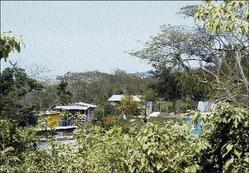Marie Henry, Gleaner Writer

Springing up behind the bushes, these houses are reportedly owned by squatters who have moved on to the Retirement property in St James.
- File
AS THE Government continues its drive to rake in millions of dollars in uncollected property taxes, a number of inner-city residents, who are occupants of hundreds of tenement yards left abandoned by their rightful owners, have expressed an interest in paying up the arrears in order to become the legitimate owners.
Speaking with The Gleaner recently, one inner-city resident of Cloverly Road, central Kingston, Pully (not his real name), explained how he and others were trying to acquire the houses where they currently reside.
He said some residents have been paying up the taxes for where they live, with the hope that they will own the property some day.Said he: "Mi caan buy land uptown (upscale St Andrew) so is dung ya mi haffi get it (downtown Kingston)." Pully is also calling on the Government and the National Housing Trust to do more to help inner-city residents to obtain these properties at affordable rates.
There are many landowners across the island who are not paying property taxes and who risk facing legal action. Currently, there are penalties attached to the non-payment or late payment of taxes. Annette Caesar-Martin, taxpayer information specialist at the Tax Administration Services Department, noted that there was a 10 per cent penalty on balances and an interest rate of 15 per cent on overdue amounts. This, she says, should deter property owners from non-compliance.
Paying property tax
Property is classified as the unimproved value of the land, that is, the bare land. For valuation and taxation purposes, the unimproved land is used. The National Land Agency establishes the price for the land (a valuation number isgiven) without considering any improvements such as buildings. From this, the tax is calculated. In 2005, the property tax rate was revised and made simpler for taxpayers to be able to do their own calculations. According to Caesar-Martin, if a property is less than $300,000 in value, the property tax would be $600 for the year. However, anything above this, one would pay $600 for the first $300,000 and for every $1 thereafter, it would be 0.5 per cent.
"All owners, possessors and agents are required to pay property tax," said Caesar-Martin. Owners are those persons whose names appear on the land title. They do not have to be physically occupying the land. Possessors, according to the tax specialist, are persons in possession of, or occupying the property, while agents are those persons or groups that lease particular properties.
One does not need a land title to pay property tax. The Tax Administration Services Department said that for individuals and property owners who want to pay tax they should provide the full name and address on the title to the tax office. To expedite the process, the volume and folio numbers are needed.
Squatters, illegal settlers
Mavis Reid, of the Inland Revenue Department, said that there are many properties that have absentee owners and these properties are in arrears. She noted that most of these properties are open lots and therefore compliance officers find it difficult to track down either owners or agents. When asked whether these lands could be confiscated, she said that the law exists, but it is usually not enforced. The law should make it possible for the Government to "advertise these properties for sale," she said.
While Government is slow to seize properties that have hundreds of thousands of dollars in tax arrears, there are those who see idle/ abandoned properties as an opportunity to establish their livelihood. There are many squatter settlements throughout Jamaica. These settlements are established on both private and state-owned lands. Some properties in the cities of Kingston and Montego Bay are abandoned by owners under circumstances of violence. There are other settlements that are developed on failed housing projects.
Ownership possible
The Squatter Management Unit of the Water and Housing Ministry, while referring to the 2002/3 National Squatter Survey said that there are over 95 squatter sites in Kingston and St Andrew alone. Some of these sites can be seen in the inner-city areas, on gully banks, sections of Gordon Town, Papine, Riverton, and across from Newcastle in the hills of St Andrew. As many as 5,000 people occupy some settlements. Reid pointed out that areas in Montego Bay, such as Flankers and Norwood, are the results of failed housing projects.
Reid noted that it is possible for an individual who is paying taxes for a property that is not his, to obtain ownership. She stated that it can be done through what is called an 'adverse possession'. The person occupying the property must prove that he has been paying tax for 12 years or more. However, she said, "this does not give automatic ownership." According to Reid, there is a procedure to follow and it has to go through the courts.
For one to get legal ownership of government property, they must be occupying it for at least 60 years. In addition, they must prove that they had 'quiet possession'. This means that there should be no interference or notice served during the time of occupation on the property.

